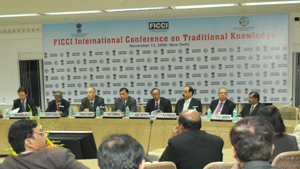International Conference Calls for Concrete Outcomes on TK, GRs & TCEs
Geneva,
November 13, 2009
PR/2009/616
WIPO Director General Francis Gurry, joined by India’s Secretary, Department of Industry and Commerce, Mr. Ajay Shankar, opened on November 13, 2009 an international conference by highlighting the importance of developing a balanced international legal framework for the effective protection of traditional knowledge (TK), genetic resources (GRs) and traditional cultural expressions (TCEs).
The one-day meeting, organized by the Federation of Indian Chambers of Commerce and Industry (FICCI), in cooperation with WIPO and India’s Department of Industrial Policy and Promotion (DIPP), Ministry of Commerce and Industry brought together international experts to discuss these questions in a frank and informal context. Experts from India, Australia, Bangladesh, Kenya, Mexico, South Africa, the United States of America and the African Regional Intellectual Property Organization, FICCI and WIPO participated.

Credit: Dhillon Photographics
Mr. Gurry said that the meeting offered a welcome opportunity to support international negotiations on intellectual property and TK, GRs and TCEs, noting that last month WIPO’s Intergovernmental Committee on Intellectual Property and Genetic Resources, Traditional Knowledge and Folklore (IGC) received its strongest mandate to date when WIPO member states agreed to launch negotiations to ensure the effective protection of TK, GRs and TCEs through the development of an international legal instrument.
The decision to move ahead with these negotiations is of great significance, Mr. Gurry said, because it recognizes TK, GRs and TCEs as part of a more universal knowledge base upon which the IP system rests.
Mr. Gurry said negotiations need to be approached in a constructive manner with a sense of pragmatism. “We have complex issues before us in adapting the IP system in providing protection for TK…We have to find pragmatic solutions. Pragmatism is the only way we will move forward,” he said. At the international level, solutions must be found at a level of generality that allows national jurisdictions the flexibility to operate. Informal forums for dialogue such as this Conference were vital, and Mr. Gurry paid tribute to FICCI’s initiative in organizing the event.
The Director General applauded India’s achievements in establishing frameworks to protect its ancient traditional knowledge systems, such as the “Indian Systems of Medicine” initiative which covers traditional healthcare systems and medicine. Mr. Gurry also noted the enactment of legislative protections for TK and GRs (Biological Diversity Act 2002; Patents (Amendment) Act 2005) and the establishment of a Traditional Knowledge Digital Library (TKDL) to supplement these laws.
Mr. Shankar said issues relating to TK and GR had moved to center stage in India and internationally in the past 10 years, propelled into the limelight by foreign patents granted over age-old Indian resources such as neem and turmeric. The Indian TKDL has been developed to defend against misappropriation of TK. The issues were conceptually novel and considerable discussion and rigorous analyses were needed.
DIPP had requested FICCI to set up a Traditional Knowledge Taskforce to explore the issues and options, Mr. Shankar said. The TKDL had been a great success. An agreement had been entered into with the European Patent Office and a fair number of patents have been denied by EPO since. The new mandate at WIPO was a good development, Mr Shankar said. The international community was moving into new unchartered territory but should be able to arrive collectively at a balanced agreement. India was committed to remaining active in this work, he observed.
The TKDL is owned jointly by the Council for Scientific and Industrial Research and the Department of Ayurveda, Yoga, Unani, Sidh and Homeopathy (AYUSH). It comprises a vast encyclopedic database of thousands of formulations in patent search compatible formats in various languages.
The New Delhi meeting brought together international and local speakers and covered developments at the WIPO IGC as well as national initiatives and programs in countries such as India, Kenya, Mexico, the USA, Australia, Bangladesh and South Africa as well as at ARIPO.
- Tel: (+41 22) 338 81 61 / 338 72 24